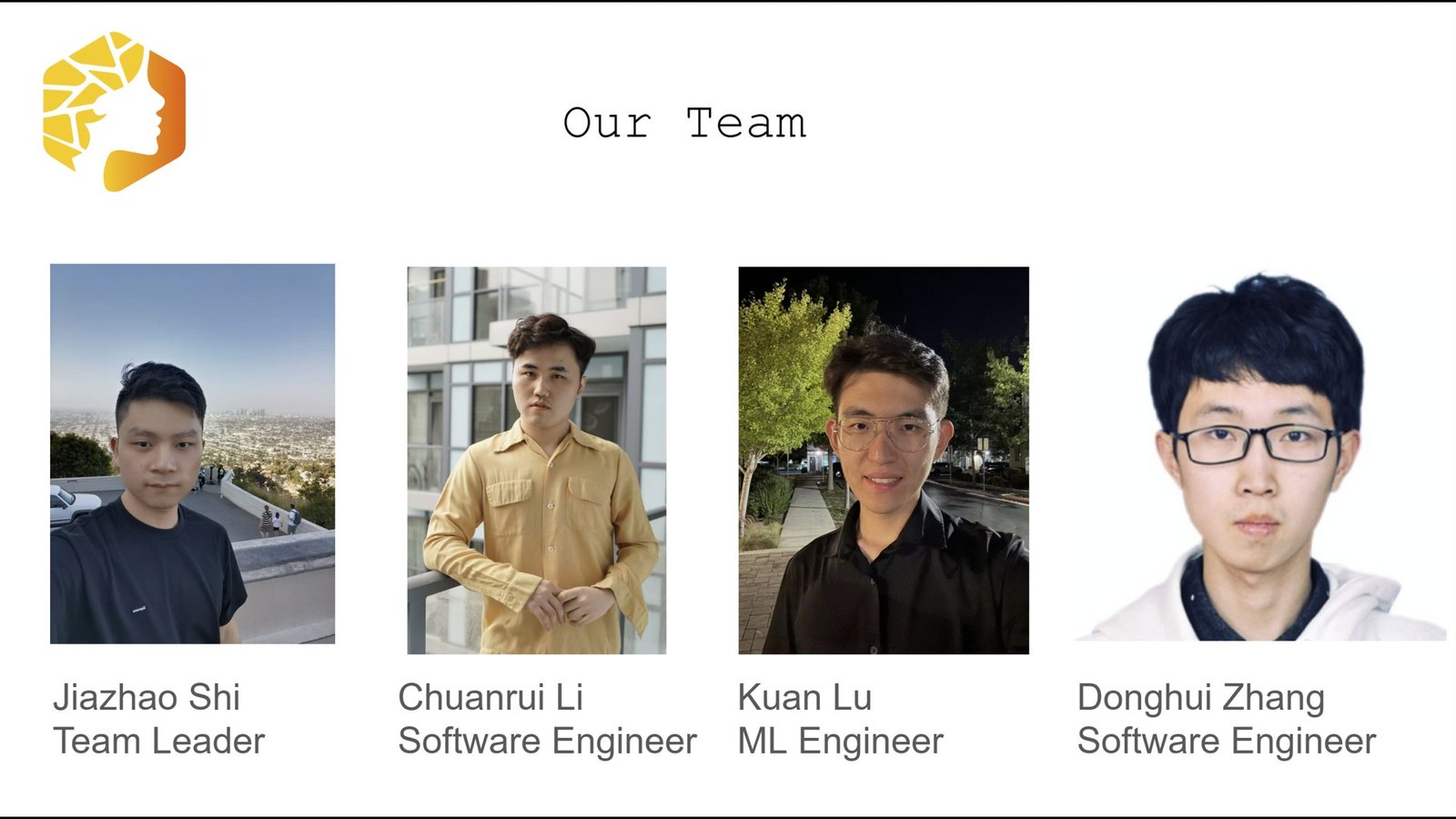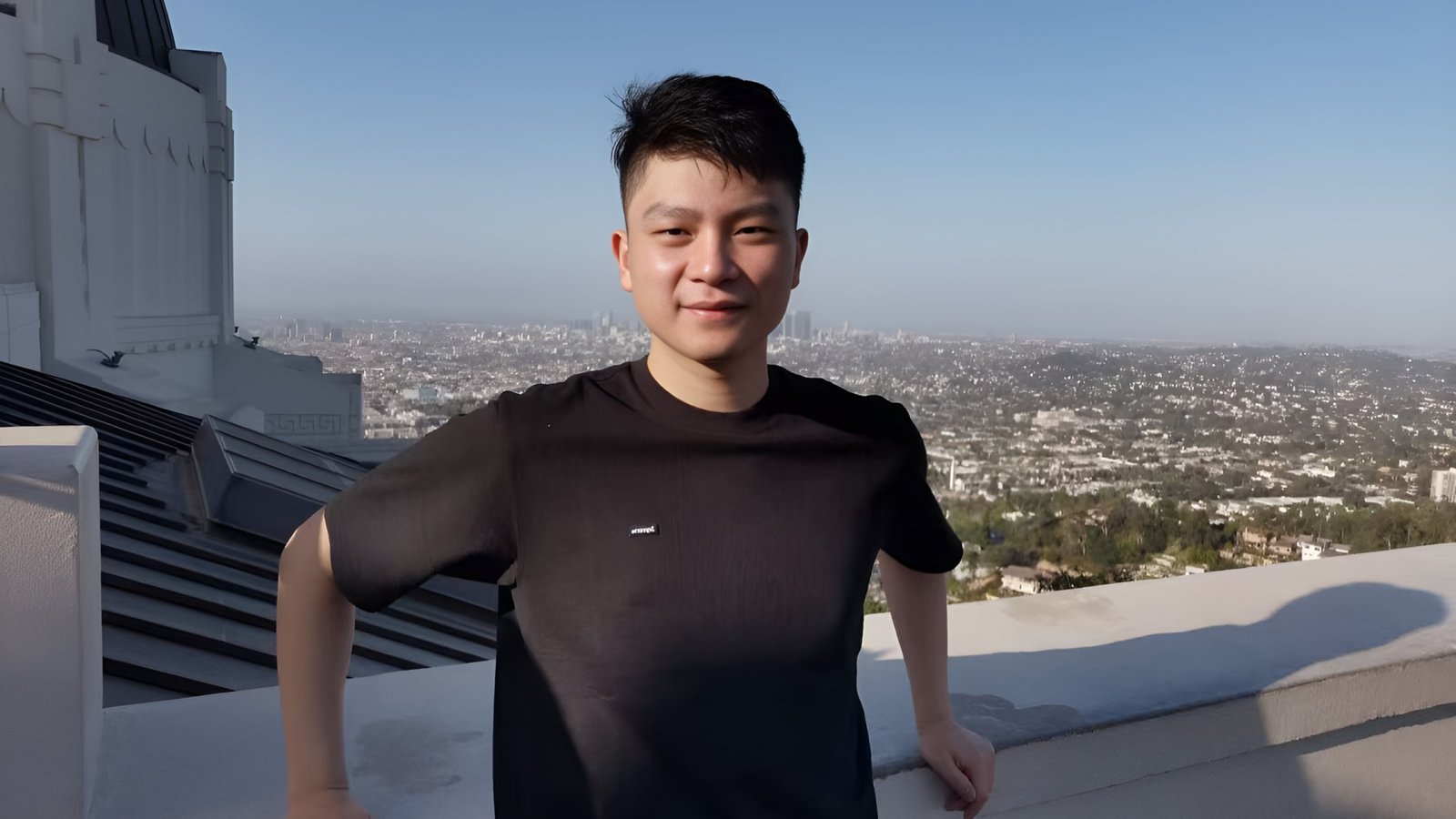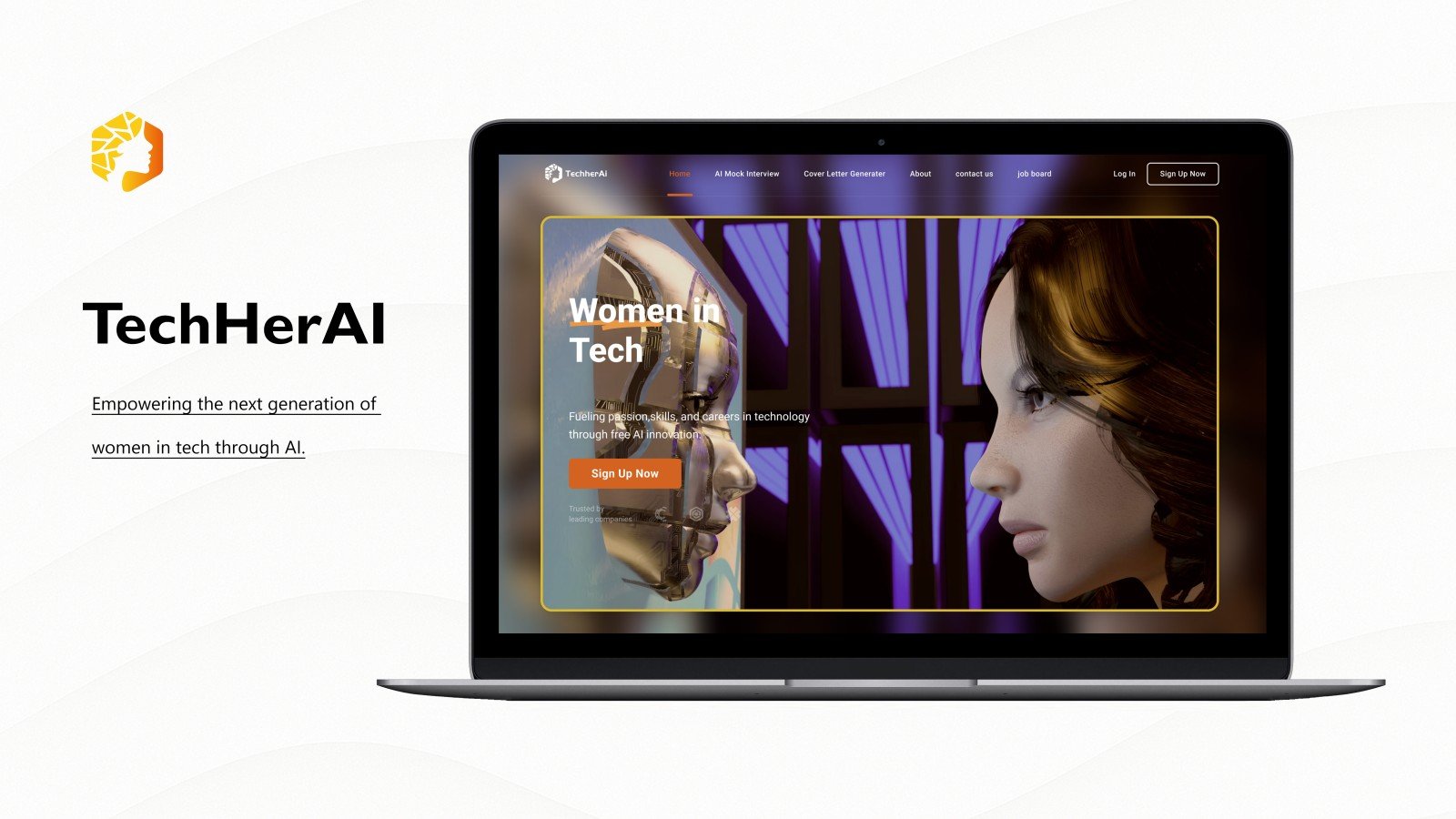
Timeless Interiors, Modern Vision: Marwan Al Kindi Speaks
August 4, 2025
The DREAM That Drove Away with Design of the Year at the 2025 MUSE Design Awards
August 5, 2025TechHerAI
The team behind TechHerAI - founded by Jiazhao Shi, Chuanrui Li, Donghui Zhang, and Kuan Lu - aims to empower women, especially recent graduates, to succeed in the tech industry by offering accessible, AI-driven career tools. Drawing from their collective backgrounds in software engineering, machine learning, and product design, they developed a scalable platform that tackles bias in tech hiring using NLP, FastAPI, and fine-tuned deep learning models.
TechHerAI is powered by a tight-knit, four-person core team that blends product vision with deep technical know-how:
Jiazhao Shi – Team Leader: A software engineer with a master’s in computer science, Jiazhao sets the product roadmap, secures partnerships, and keeps our nonprofit mission—opening doors for women in tech—front and center.
Chuanrui Li – Software Engineer: Chuanrui architects our backend in Python + FastAPI, integrates cloud infrastructure, and ensures every mock-interview session runs smoothly and at scale.
Kuan Lu – Machine Learning Engineer: Kuan fine-tunes large language models with supervised learning and RLHF, using curated résumé–job-description pairs to boost semantic alignment and response fluency across our interview, cover-letter, and job-board tools.
Donghui Zhang – Software Engineer: Donghui focuses on front-end experience and data pipelines, turning complex AI outputs into clear, confidence-building feedback screens and dashboards.
Together, we pair industry experience with a shared commitment to inclusion. By combining applied NLP research, full-stack engineering, and user-centered design, we deliver free, AI-driven career support that helps women graduates prepare, grow, and thrive in today’s challenging tech landscape.
The driving force behind our submission is the widening gap we see—everyday—between opportunity and access for women starting tech careers. Recent layoffs and hiring freezes have made entry-level roles scarce; meanwhile, AI advances have lowered the barrier for building smart, personalized tools.
TechHerAI sits at the intersection of those two trends: we apply state-of-the-art language models to deliver free mock interviews, résumé guidance, and curated job leads that would otherwise be out of reach for many candidates.
Creating and refining this platform directly advances both our nonprofit mission and our personal goals as engineers. As individuals, we wanted our AI skills to create visible social impact rather than just incremental enterprise gains. As an organization, we measure success by the number of women who land roles, gain confidence, and stay in tech.
Submitting to the TITAN Innovation Awards pushed us to benchmark our solution against global best practices, document measurable improvements in interview readiness, and spotlight a scalable model that other communities can replicate. Recognition from TITAN validates that mission and accelerates our broader goal: building an open, supportive ecosystem where underrepresented talent can thrive.
Our award-winning entry introduces a scalable, AI-powered preparation loop for women entering the tech industry—built entirely on open-source models and custom orchestration. Here’s what sets it apart:
1. Multi-Agent Mock Interview System: We built a modular system that uses multiple lightweight AI agents, each with a specific role—question generator, follow-up probe, soft-skills evaluator. These agents collaborate in real time, simulating the depth and flow of real interviews. The system is developed with FastAPI and Hugging Face Transformers, using open-source LLMs derivatives.
Agents share context and avoid redundancy by operating through a controlled orchestration layer. Each session adapts to the user’s résumé, job description, and prior answers, creating a tailored interview experience.
2. Real-Time Feedback Engine: Instead of generic tips, we provide granular, actionable feedback immediately after each response; user answers are embedded and scored using a similarity-based rubric against curated answer samples. Feedback includes behavioral and technical ratings, plus suggestions like "be more specific about your impact" or "clarify the tools used." The scoring system is fast and lightweight, delivering response insights in under a second, even on modest hardware.
3. Resume-Based Cover Letter & Smart Job Matching: We leverage open-source LLMs with instruction tuning to generate personalized cover letters by aligning résumé content with job descriptions using a dual-encoder architecture. Rank job listings using a learning-to-rank model trained on user preferences and click behavior. Aggregate listings from public APIs, presenting them in a clean, ranked interface filtered by skills, location, and job type.
4. Inclusive and Ethical Design: We’ve integrated toxicity filters and bias detection layers to minimize harmful or biased content. All models run on affordable, self-hosted GPUs with streaming responses, making the platform accessible even on slow connections or mobile devices.
What makes our platform unique is its holistic, open-source-powered pipeline: it not only simulates realistic interviews but also provides real-time feedback and job application support, all tailored for women entering tech. By combining practical engineering with community-centered design, we’ve built something impactful, scalable, and free.
As the team leader, I (Jiazhao Shi) guided the vision and execution of TechHerAI from idea to impact. My key contributions included:
Defining the product direction: I identified the core needs of women entering tech—confidence-building, personalized guidance, and job readiness—and shaped our AI-driven solution around those pain points.
Coordinating cross-functional collaboration: I aligned our machine learning, backend, and frontend efforts to ensure seamless integration between our mock interviews, cover letter generator, and job board.
Driving quality through iteration: Drawing from my experience as a software engineer, I emphasized measurable outcomes, and continuous improvements—especially in model performance and UI clarity.
Ultimately, my leadership helped transform a shared mission into a scalable, impactful platform—built by a small but dedicated team with a big goal: empowering the next generation of women in tech.
TechHerAI addresses a critical and timely problem: Women—especially recent graduates—face systemic barriers when entering the tech industry, which have been further intensified by ongoing layoffs and hiring freezes. Traditional job preparation resources are often costly, generic, or inaccessible, leaving many candidates underprepared and overlooked.
Our innovation solves this by providing a free, intelligent, and personalized career support system built specifically for underrepresented groups in tech. Here's how it improves existing processes:1. Mock Interviews Made Scalable and Adaptive: Traditional mock interviews require human interviewers and are hard to scale. TechHerAI’s AI-driven system simulates realistic technical and behavioral interviews, adapts to résumés and job descriptions, and provides detailed feedback, helping users iterate and improve without needing a human counterpart.
2. Personalized Cover Letter Generation: Writing tailored cover letters is time-consuming and difficult for those new to the workforce. Our generator instantly creates professional, role-specific cover letters using NLP models fine-tuned on real resume–JD pairs, dramatically reducing effort while boosting quality.
3. Smarter Job Search: Instead of overwhelming users with scattered job listings, our AI-powered job board curates and ranks opportunities based on skills, goals, and user behavior—streamlining the job search and increasing match relevance.
By combining AI innovation with mission-driven design, TechHerAI turns fragmented and inequitable job prep into a personalized, scalable, and inclusive experience, helping more women launch successful tech careers.
What makes TechHerAI stand out is the way we blend cutting-edge AI with real-world usability to tackle a deeply human challenge—helping women break into tech. Here are the key features that set our innovation apart:
1. AI-Driven Mock Interviews - Our system dynamically generates behavioral, technical, and resume-specific interview questions using fine-tuned large language models. Each session provides detailed, per-question feedback, improvement tips, and exemplar answers—creating a personalized, confidence-building experience.
2. Resume-Based Cover Letter Generator - Crafting tailored cover letters is a pain point for many job seekers. Our tool analyzes both the user’s résumé and the job description to instantly generate high-quality, personalized cover letters—saving time while improving application impact.
3. Intelligent Job Board - Instead of dumping job listings, our board curates tech roles from multiple sources and ranks them based on relevance to a user's background and interests. Over time, it learns from user behavior to improve results—turning passive listings into actionable leads.
4. Custom Fine-Tuning with Human Feedback - We don’t rely on generic models. Our team fine-tuned open source models using supervised learning and reinforcement learning from human feedback (RLHF) on curated résumé–job description pairs. This boosts both accuracy and contextual relevance.
5. End-to-End Free and Mission-Driven - Unlike many platforms that lock value behind paywalls, TechHerAI is entirely nonprofit and free to use. Our mission is to level the playing field for underrepresented women in tech—not to monetize their career journey.
In short, TechHerAI is not just an AI product—it’s a holistic, mission-aligned system combining scalable technology with real community impact.
At TechHerAI, our team played the central role in bringing this idea to life, from concept to execution. As a nonprofit initiative, we didn’t have a corporate sponsor or commercial backing; instead, every line of code, model tuning, and design decision came from our four-person core team.
We combined our strengths across engineering, AI, and product design to create a platform that’s not only technically robust but also deeply mission-driven. From building the backend infrastructure in Python and FastAPI, to fine-tuning large language models with real-world résumé and job description data, to crafting an intuitive user interface that supports and empowers—every aspect was handled in-house.
Beyond technical development, we also engaged in outreach, user testing, and mentorship coordination to ensure our tools met the real needs of women navigating today’s job market. Our collective effort made TechHerAI not just a product, but a community-driven solution to a systemic problem.
One of the biggest challenges we faced was data quality and alignment. Since interview feedback is often unstructured or scarce, we had to build our own dataset from scratch—crawling real-world interview examples, generating synthetic Q&A pairs using open models, and applying extensive cleaning, bias filtering, and labeling. This required not only strong data engineering skills but also a deep understanding of hiring patterns and language semantics.
Another major hurdle was ensuring the AI’s responses were both accurate and helpful. Large language models can be fluent but not always precise, so we fine-tuned open source models using supervised learning and RLHF techniques to improve alignment with candidate intent and recruiter expectations. This process demanded careful experimentation and rigorous evaluation, especially from our ML engineer, Kuan.
On the backend, building a scalable system that delivers real-time, interactive interviews came with its own set of challenges—particularly around performance, latency, and user flow. Chuanrui and Donghui worked together to optimize API design, session handling, and front-end responsiveness using FastAPI and cloud-native tools.
As team leader, Jiazhao coordinated the entire effort, using product management skills to align our technical roadmap with user needs, manage tight timelines, and ensure our mission stayed central throughout. Our diverse strengths in machine learning, full-stack development, and user experience allowed us to turn complex challenges into a polished, mission-driven product.
We hope TechHerAI becomes a catalyst for greater equity and access in the tech industry. By offering free, AI-driven career support—including realistic mock interviews, personalized cover letters, and a smart job board—we aim to level the playing field for women, especially recent graduates who often lack mentorship and opportunities.
Our goal is to break down systemic barriers that have kept many capable women from advancing in tech. We want to empower users not just to apply for jobs, but to apply with confidence, clarity, and competitive materials. By integrating large language models with human-centered design, we’re making high-quality career prep scalable, accessible, and inclusive.
In the long term, we hope TechHerAI can serve as a model for how AI can be used responsibly—not to replace people, but to uplift and support underrepresented communities, helping to create a more diverse and resilient tech workforce.
Winning the TITAN Innovation Awards affirms our vision that technology should be a force for equity, not just efficiency. At TechHerAI, we believe innovation means more than building advanced systems—it means using those systems to solve real-world problems, especially for underserved communities.
This award highlights how applied AI can lower barriers for women entering tech by providing free, scalable tools like mock interviews, resume-based cover letter generation, and intelligent job matching. It validates our approach of combining cutting-edge NLP models with a deep understanding of users' needs to create a meaningful, practical impact.
For us, technological progress isn’t just about pushing the frontier of what AI can do—it’s about ensuring those benefits are accessible to everyone. This recognition inspires us to continue developing inclusive, mission-driven solutions that empower the next generation of women in tech.
One of our biggest challenges was data quality and alignment. Building an effective AI interview system requires large volumes of high-quality, real-world Q&A data, which is rarely publicly available. To overcome this, we combined three approaches:
1. Web crawling: We gathered real interview feedback from public forums and blogs.
2. Synthetic generation: We used large language models to generate question–answer pairs based on common tech roles.
3. Data cleaning and feature engineering: We applied bias filters, de-duplication, and added features like skill tags and salary levels to improve training quality.
Another challenge was ensuring performance with limited resources. As a small nonprofit team, we had to optimize carefully. We fine-tuned the open source models using supervised learning and RLHF, which required thoughtful prompt design, efficient GPU usage, and lots of iteration to get reliable, context-aware results.
Lastly, we faced user trust and engagement hurdles. Many users were skeptical of AI-generated career guidance. We tackled this by partnering with experienced engineers who volunteered as mentors, adding a human layer to validate our tools and build community trust.
These challenges shaped a better product—more inclusive, more data-driven, and more scalable.
We believe TechHerAI represents a shift in how job readiness and career support are delivered, especially in industries like tech where underrepresentation and access gaps persist. By leveraging large language models to simulate interviews, generate personalized application materials, and surface curated job opportunities, we’re redefining what scalable, personalized career support can look like.
In the long term, we see our innovation driving three key changes in the industry:
1. Democratization of Career Preparation - Traditional career coaching is expensive and inaccessible to many. TechHerAI proves that high-quality, individualized guidance—once reserved for a privileged few—can be delivered at scale and for free.
2. Fairer, Data-Driven Hiring Pipelines - By helping candidates practice in structured, feedback-rich environments, we reduce anxiety and improve performance—especially for those from nontraditional or marginalized backgrounds—making the hiring process more equitable.
3. AI as an Empowerment Tool, Not a Replacement - Our platform showcases how AI can be used to empower individuals rather than replace them, offering tools that enhance human potential, build confidence, and open doors in competitive fields.
As more industries face rapid change, we hope TechHerAI serves as a blueprint for mission-driven, AI-powered platforms that address systemic barriers and unlock opportunity at scale.
We’re especially excited by the rapid evolution of large language models (LLMs) and their growing ability to handle nuanced, real-world tasks like interviewing, career coaching, and document generation. Recent advancements in instruction tuning, reinforcement learning from human feedback (RLHF), and tool use via agents have expanded what AI can realistically and responsibly do, especially in education and career readiness.
For TechHerAI, these breakthroughs directly shape how we build. We fine-tuned open-source models on carefully curated résumé–job-description pairs and layered in RLHF to enhance feedback accuracy and personalization. This allows our mock interviews and cover letter generator to go beyond templates, offering context-aware, tailored support that feels human.
We’re also tracking trends in AI fairness and bias mitigation, which are crucial in building inclusive tools. Since our mission is to support women entering tech, we actively audit our outputs for bias and continuously improve our prompts, training data, and model behavior to ensure equitable experiences for all users. In short, the intersection of cutting-edge LLMs, ethical AI design, and real-world application is where we work—and what drives us forward.
Stay mission-driven, not trend-driven. Transformative ideas often emerge from deeply felt problems, so ground your work in real human needs, not just technology for its own sake.
Here are a few principles we’ve found essential:
1. Start small, solve deeply - Focus on one core pain point and solve it well. Our first goal was simple: help women practice interviews. From there, we expanded based on the user's needs.
2. Use AI responsibly - With powerful tools like LLMs, it’s easy to overpromise. Make sure your AI adds real value, and take the time to fine-tune and evaluate it carefully, especially when users rely on it to make life-changing decisions.
3. Validate early with real users - Build quick prototypes and test often. Don’t wait until it’s “perfect.” The faster you know the users, the faster you can improve.
4. Stay close to your mission - Technology changes fast. But if your mission is clear and meaningful, it will guide your choices and keep your team aligned through ups and downs.
In short: Listen deeply, build responsibly, and never lose sight of why you started.
Winning Entry
TechHerAI: AI-Driven Tools to Empower Women in Tech | 2025 TITAN Innovation Awards
TechHerAI is a nonprofit platform built to support women in tech—especially recent graduates navigating an increasingly competitive job market. As layoffs ripple through the industry, breaking into tech has become even harder for those already underrepresented... (read more here)

TechHerAI
The team behind TechHerAI - founded by Jiazhao Shi, Chuanrui Li, Donghui Zhang, and Kuan Lu - aims to empower women, especially recent graduates, to succeed in the tech industry by offering accessible, AI-driven career tools. Drawing from their collective backgrounds in software engineering, machine learning, and product design, they developed a scalable platform that tackles bias in tech hiring using NLP, FastAPI, and fine-tuned deep learning models.
Read the interview on Mastering SAP Upgrades and Migrations with Srinivas Kolluri here.







